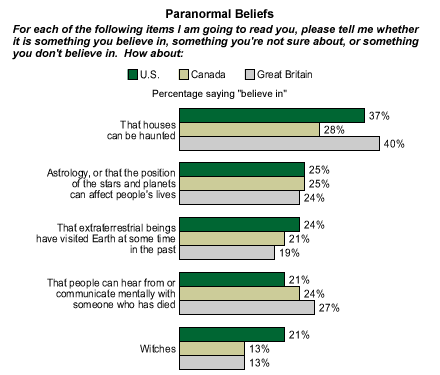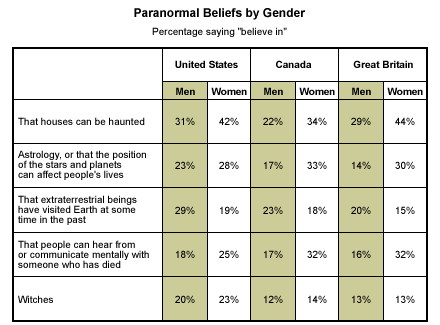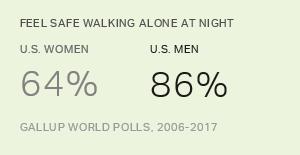The spirits who roamed the Earth last night on All Hallows' Eve may have deferred today to All Saints, but it nevertheless remains an appropriately eerie time of year to examine the paranormal beliefs in the United States, Canada, and Great Britain*.
Haunted Houses
Perhaps because most people have to search no farther than their own hometowns to find a house that's rumored to be haunted, more people in each country believe in haunted houses than any of the supernatural or paranormal items tested; 37% of Americans believe, as do 28% of Canadians and 40% of Britons.

What's Your Sign?
About a quarter of those in each country believe in astrology, or the belief that the position of the stars and planets can affect people's lives. "I'm pretty good at judging people's astrological signs," says Soren Kerk-Tabor, a professor of sociology at California State University in Los Angeles. "Once, as I was being put under sedation for an operation, I saw all the shining faces of the OR staff looking at me and I nailed their signs one by one. They looked shocked, and then I fell asleep." [Kerk-Tabor also correctly identified this writer's astrological sign -- after just a 5-minute telephone conservation.]
Belief in Witches
The witch trials in Europe and the United States ended hundreds of years ago, but Americans are significantly more likely to believe in witches than are Britons and Canadians. One in five Americans (21%) say they believe in witches, compared with 13% for both Canada and Great Britain. However, witches are the only item on the list in which a solid majority of respondents in all three countries do not believe.
Women More Open Than Men to Some Paranormal Beliefs
A closer look at the data reveal that belief can differ by gender. Women are more likely than men to believe in haunted houses, communicating with the dead, and astrology. Men, on the other hand, show a slightly greater proclivity than women to believe in extraterrestrial beings.

Forty-two percent of U.S. women believe that houses can be haunted versus 31% of U.S. men; it's 34% vs. 22% in Canada, and 44% vs. 29% in Britain. Differences in belief between men and women in Canada and Great Britain are quite pronounced when it comes to astrology and the ability to communicate with the dead; women in both countries are about twice as likely as men to hold those beliefs. American women are more likely than men to believe in astrology and communication with the dead, but by a much smaller margin than in the other two countries.
Kathleen, a New Jersey counselor who treats both men and women for a variety of issues, isn't surprised by the finding that women are, in some cases, bigger believers in the paranormal. She suspects it's a function of how men's and women's brains work. "Women are just more receptive, more intuitive, and more plugged in, whereas men tend to be logical and sequential," she says. "In my work, I find that women are much more inclined to speculate about hypothetical situations."
Kerk-Tabor agrees that women are more likely than men to believe in the paranormal, but for a different reason. "Men tend to judge themselves competitively," she says. "They ask, 'Am I better than you?' whereas women encompass the whole and ask, 'Where do I fit in?' This inclusiveness may help women to be more receptive to the 'magical stuff' -- things that exist in a different paradigm, in another realm."
ET
Interestingly, among the five paranormal beliefs tested, only one item receives more credence from men than women in all three countries: the belief that the Earth has been visited by extraterrestrials. A similar tendency was found in a subject-related Gallup Poll question to U.S. respondents in 1996 -- Do you think that UFO's have ever visited Earth in some form, or not? Fifty-one percent of men thought it was true, compared with just 40% of women.
"It doesn't surprise me at all that women are less interested in extraterrestrials than [are] men," says Frank Drake, director for the Center for the Study of Life in the Universe at the SETI Institute. "It reflects two things -- it's well-documented that girls in school lose interest in science at about age 12, and people who are educated in science are much more likely to believe in life in outer space."
*Results in the United States are based on telephone interviews with 1,002 national adults, aged 18 and older, conducted June 6-8, 2005. For results based on the total sample of national adults, one can say with 95% confidence that the maximum margin of sampling error is ±3 percentage points. The survey was conducted by Gallup USA.
Results in Canada are based on telephone interviews with 1,005 national adults, aged 18 and older, conducted Aug. 22-31, 2005. For results based on the total sample of national adults, one can say with 95% confidence that the maximum margin of sampling error is ±3 percentage points. The survey was conducted by Gallup Canada.
Results in Great Britain are based on telephone interviews with 1,010 national adults, aged 18 and older, conducted Aug. 26-Sept. 8, 2005. For results based on the total sample of national adults, one can say with 95% confidence that the maximum margin of sampling error is ±3 percentage points. The survey was conducted by Gallup UK.
